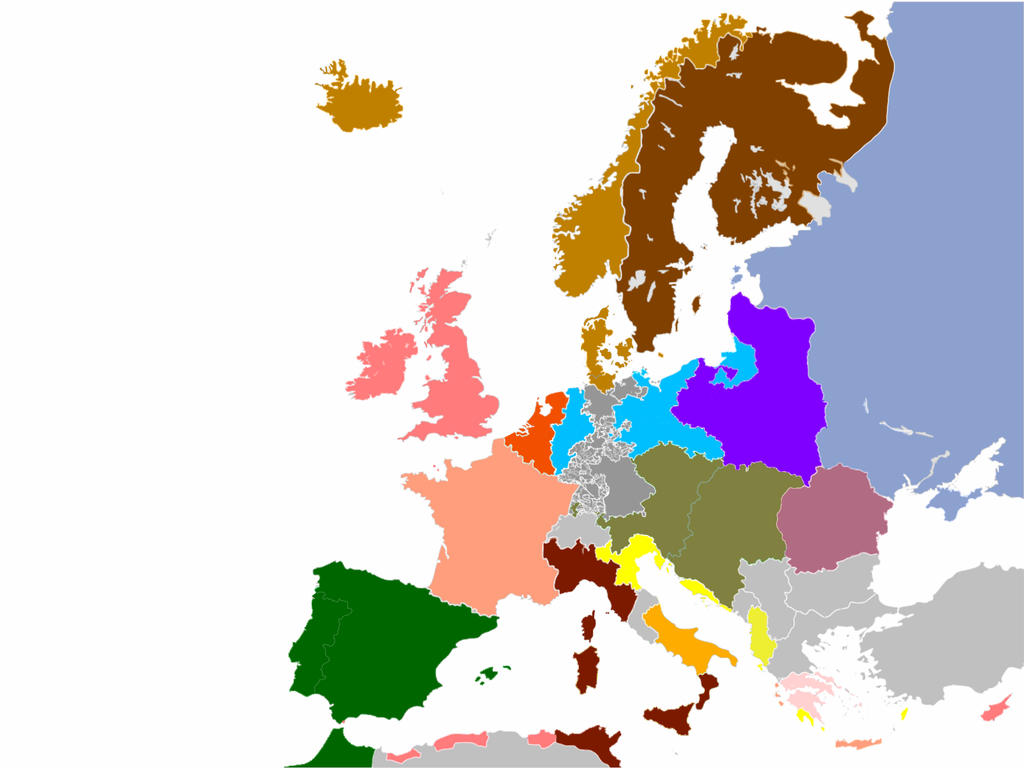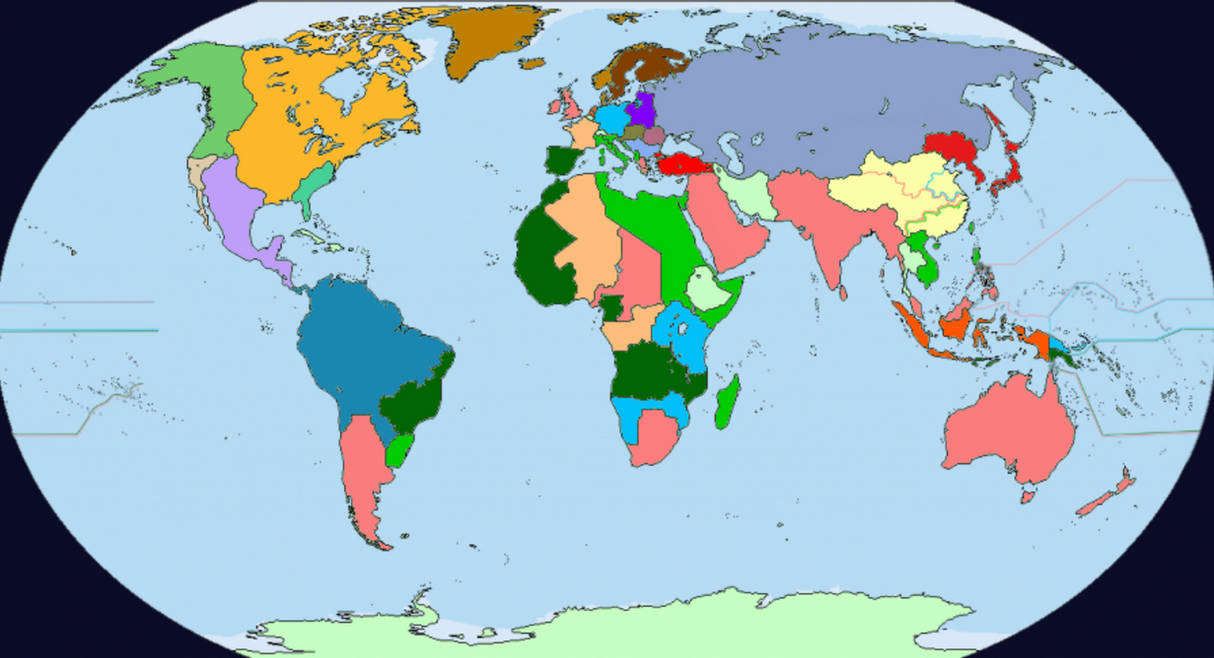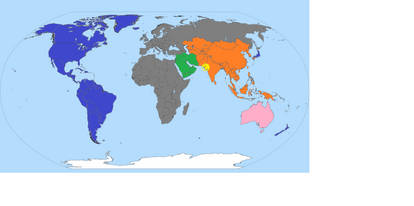Deviation Actions
At the dawn of the eighteenth century modern Europe was beginning to take shape, Spain was ceding the role of dominant power over seas to England, Prussia and Russia were on the rise taking advantage of the fact that the Swedish and the Ottoman Empire were on the edge of their process of disintegration, Louis XIV, who made France the most powerful state in Europe,was at the end of its kingdom and the country will know in less than one century one of the most important event for her history and for the history of the whole world, the French Revolution (the first one at least). In 1701 Charles II of Spain died with no direct heirs and the War of the Spanish Succession saw Castille, supported by France, facing Aragon, supported by England, the HRE, Savoy, Nethelands and Portugal. In OTL, the war ended with the defeat of France who was still able to put Philip V, son of the deceased Dauphin of France, Louis le grand Dauphin, on the throne of Spain. In this AH scenario I supposed that France was able to win the war and that Louis the Dauphin never died before the death of its father Louis XIV, eventually being able to get for itself, first the Crown of Spain and later, in 1715 (death of Louis XIV) the Crown of France,
Europe 1715
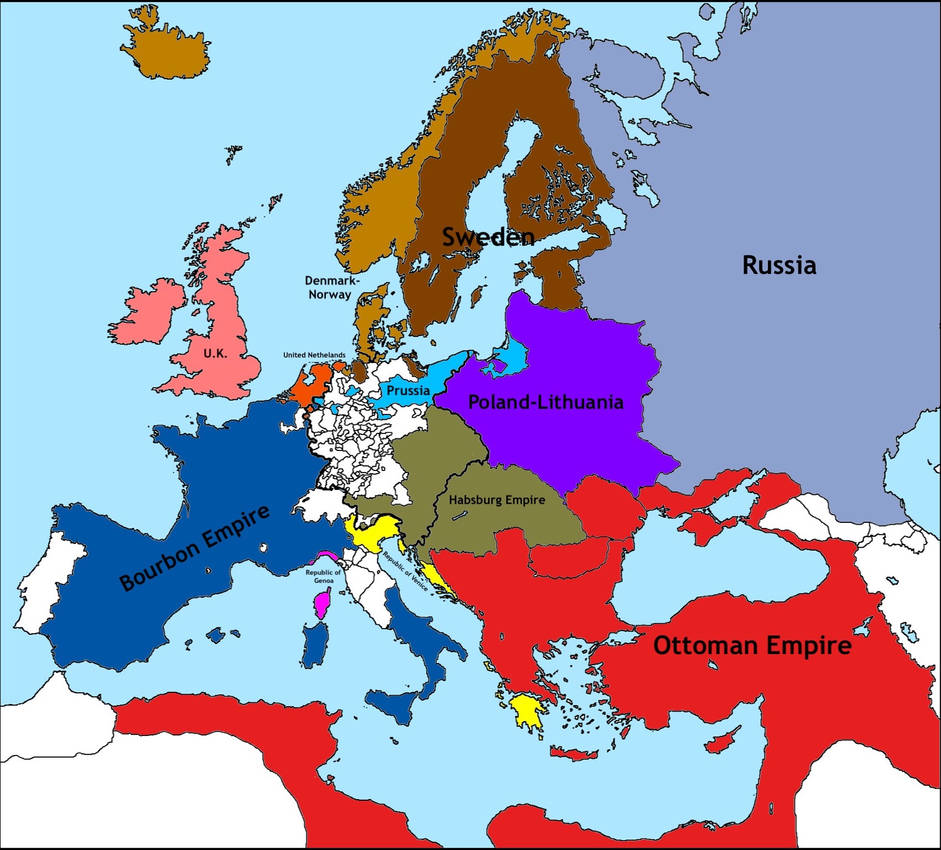
The World 1715

The war of the Polish succession doesn’t occur since France has to take breath from the harsh Spanish war, it already has Lorain and doesn’t object for the succession of the polish throne, instead the war of the Austrian succession goes on with almost the same alliances, France and Prussia win but Maria Theresa is still able to get the throne, Prussia still gains Silesia, but Tuscany and Parma go under the direct control of France-Spain, at this point it is clear that the Bourbon king wants to control also the Italian peninsula.
Europe 1750

Europe 1775

Europe is now divided in two blocks: the west, a sort of english sphere of influence, where constitutional monarchy is quickly spreading, and the east, where absolute monarch are still on power, sole exception, Prussia, the center of the marginal enlightenment movement of this timeline, nevertheless, the spreading of parliamentary monarchies, is beginning to stimulate new ideals of democracy. In fact these ideals reach quickly the Republic of Venice which, in 1789, changes profoundly its political system, introducing a constitution, a parliament, a head of state and a wider vote right, these mesures, along with others, make Venice know a period of economical essor.
Anyway, tensions between the two blocs are increasing, in 1793, the invasion of Poland by Russia and Prussia is the casus belli for England, which enters on the side of Poland (the similarity with OTL WWII is absolutely accidental ![]() ), rapidly every other country in both blocks enter the war. This war is called The Great European War and divides itself in two phases: a first one, that goes from 1793 to 1799, which is mainly focused on the baltic-polish scenario, it is characterized by low intensity, and a second one which starts in 1799 when revolts against the Ottoman Empire break out in balkans (this revolts where heavily fomented by UK, that had interests in the fall of Ottoman Empire (control over Suez and Egypt)), at this point a number of revolutionary armies, together with Venice, start to fight in the balkans on England side, the Ottoman Empire joins Russia, Prussia and Austria. The war increases dramatically its intensity: it is no more a simple war between monarchs, like many of the previous centuries, but a real clash of ideals, a the end English and allies win, liberal ideals win, and that’s why this war will be used by historians to mark the border between modern age and contemporary age (the role that is played by french revolution in OTL). The war ends in 1814, with the treaty of Vienna, its effect are mainly:
), rapidly every other country in both blocks enter the war. This war is called The Great European War and divides itself in two phases: a first one, that goes from 1793 to 1799, which is mainly focused on the baltic-polish scenario, it is characterized by low intensity, and a second one which starts in 1799 when revolts against the Ottoman Empire break out in balkans (this revolts where heavily fomented by UK, that had interests in the fall of Ottoman Empire (control over Suez and Egypt)), at this point a number of revolutionary armies, together with Venice, start to fight in the balkans on England side, the Ottoman Empire joins Russia, Prussia and Austria. The war increases dramatically its intensity: it is no more a simple war between monarchs, like many of the previous centuries, but a real clash of ideals, a the end English and allies win, liberal ideals win, and that’s why this war will be used by historians to mark the border between modern age and contemporary age (the role that is played by french revolution in OTL). The war ends in 1814, with the treaty of Vienna, its effect are mainly:
- Polish-Lithuanian commonwealth survives, losing something on the east to Russia but gaining also something on the west
- Austria loses the low countries to Netherlands, minor adjustments of borders between Prussia and Netherlands
- Sweden gains the access to arctic ocean along with many territories from Russia
- Prussia annexes all of Saxony, Swedish Pommern (which they don’t need anymore having arctic ocean) and expands Rhineland
- the Kingdom of Romania, the Kingdom of Serbia and the Kingdom of Bulgaria are created on english constitutional monarchy style, the Kingdom of Montenegro expands
- Austria gains Bosnia but loses part of Transylvania to Romania, Trieste and Istria to Venice, which want to be the only ruler of Adriatic sea
- the Kingdom of Northern Italy annexes Sicily, Sardinia and Calabria, the rest of former Kingdom of two Sicilies fall in a civil war between republicans and monarchists, the great powers decide not to intervene, but this will cause some problems, actually the pope openly supports the monarchists, whereas Venice secretly supports the republicans. At a certain point thought republicans are able to win the war against monarchist, instead of stoping there they decide that the pope has to pay for its betrayal and they invade the Papal State, having a number of victories. Thought all of this stays a secondary event, it shocks Europe, anyway, thanks to Venice intervention the Pope is not overthrown, it will only have to give up some territories to the Republic of Naples, in addition he will give Emilia to Venice in gratitude
- Venice and England divide themselves the ex-Ottoman eastern mediterranean, Venice creates the protectorate of Albania and Britain creates the protectorate of Greece, Venice obtains the control over Sinai and part of Judea, Britain will have Egypt and Sudan, actually Britain, Northern Italy, Venice and Portugal start to colonise North Africa.
North America 1800
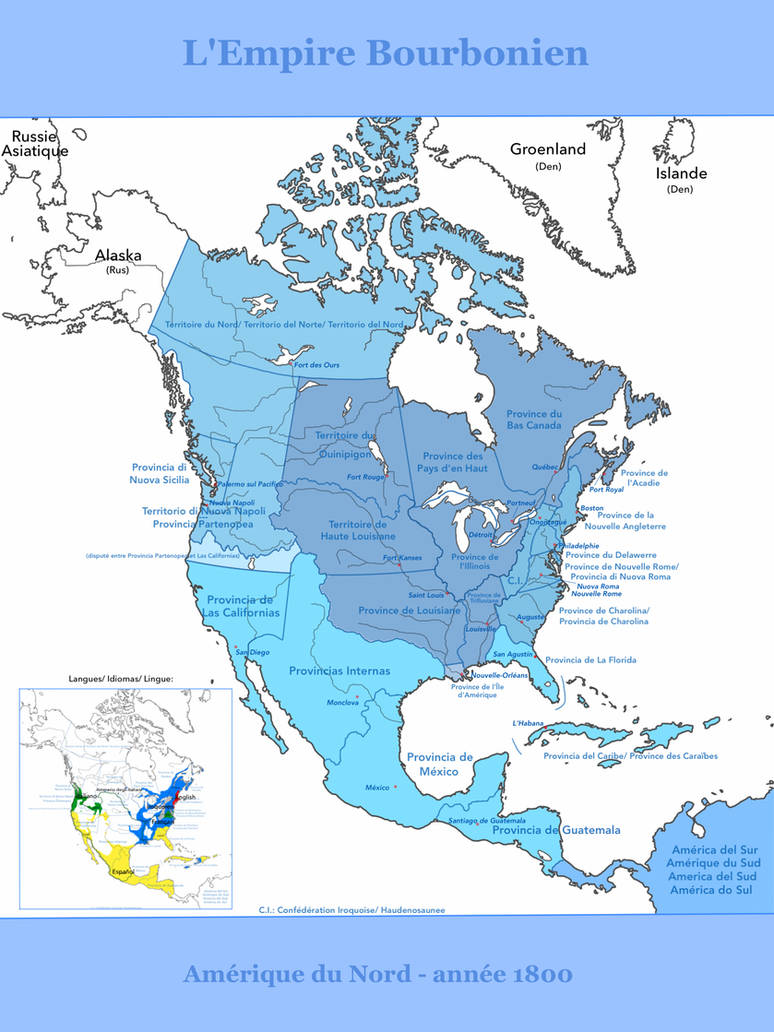
langauges map
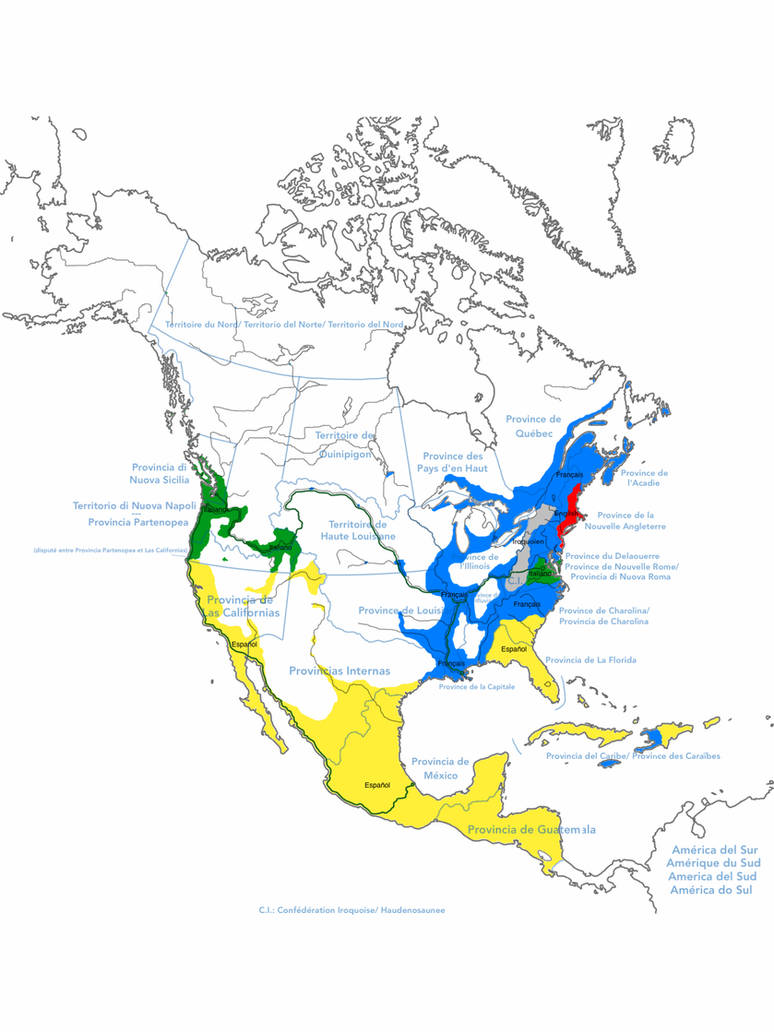
North America 1825

The World 1860

England is increasing its presence in the world: in southeast Asia, it has gained east India and Philippines to the detriment of Bourbons already in the last decades of XVIII century, turning its attention to Africa after 1816, here it has to face the presence of other European powers especially, Portuguese, Venetians, Prussians, N.-Italians and French, in fact these countries are advancing their claims over the continent: sometimes war breaks out, but finally, around 1840s the situation seems to be stabilized with Britain controlling a big part of Africa.
In the same period, the Pacific is the stage for new tensions, here Prussia, Portugal and England, start rushing for the control over the pacific islands, Venice also tries to, but it is stopped by Britain after getting northern Philippines, Indochina and Formosa (Taiwan)
in 1852 England, having gained control over Falkland Islands, Invades (what remains of) the Bourbon Empire from La Plata river, helped by Portugal and Northern Italy. The war is very hard for the distance and the dimensions of the war battlefield, but finally in the battle of Rio de las Palmas, Bourbons are defeated and in the treaty of Buenos Aires they are forced to give up a big part of South America to Britain, Portugal and Northern Italy.
In North America tensions between federal states are increasing, this leads to a total dismemberment of it in 1849, a number of new independent republics are formed, and being to wage war one another.
The World 1900
In 1856, after losing the war against the Luso-British, the Bourbons have to face in South America the revolution that will definitely put an end to their reign, after getting the power the revolutionaries rename the South American Bourbon Kingdom, the Republic of Columbia. In the meantime, in North America, new countries make war over political issues, similarly to OTL American civil war. Five of them will emerge.
In Europe the year 1855 is the year of the Congress of Berlin, it will be a secret meeting between the major European countries but the United Kingdom won't be invited, the decision that will be taken concerns two main areas and will define a big part of the destiny of the entire Eastern Hemisphere for lots of years to come:
- the first area are the Balkans, here the Habsburg consent to retain only the Hungarian speaking contiguous area plus the Kingdom of Croatia to keep an access to the sea, this move will allow their reign to stabilize around the Hungarian nation, thus they will rename the country Hungarian Empire, the rest will be partitioned between Germany (that unites under Prussia in this occasion), Poland, Yugoslavia (which is also formed in this occasion), Romania and Venice (that will form a Confederation with N. Italy and Naples).
- the second area is Africa, here the majority of European colonial countries consider that the UK has claimed an area much bigger than what they really controlled, in addition to that they all had interests in connecting their possessions so they agree to a new partition. Predictably the UK doesn't consent to that and the so called Great African War brakes out in 1859, just before that, Northern Italy and Venice decide to found a Confederation in which they keep their sovereignty but will put all their colonies under a joint administration of a parliament and a government which will also care for the army and the foreign policy, the Republic of Naples is also integrated in change for the re-annexation of Calabria and Sicily.
Attacked on almost all sides the British have to give up in 1864 after 5 years of war, they surrender to some conditions though, in fact they will gain Arabia and some other territories in a war against the Ottomans, fought with the help of Russia in 1865, after which this empire falls and is replaced by Turkey. In the meantime of the Great African War, Columbia takes the chance to start a reconquista war against the British in the south, to do this they make territorial concessions to Portuguese in the east and at the end they will recover Paraguay and southern Bolivia area from the UK.
In 1869 Germany, UK and Italy invade extremely weakened China and in 1872 divide it in influence zones.
In 1888 the Pope in Rome is over-throned and a republic is instaurated, the Italian Confederation breaks in the revolution and mediates between the revolutionaries and the Pope, the latter will keep a little area in the City of Rome as an independent state the rest will join the Confederation as the Republic of Rome.
Russia is also engaged in an expansive campaign through south, in 1862 they invade northern China, in 1864 they force Japan to hand over Northern Manchuria (Japan will later have some territories to the south, as compensation), following the war to the Ottomans in 1865 they get some more Armenian territories, after that they invade northern Persia, the problem with it is that UK also has growing interest in the middle-eastern country so new tensions grow.
The Persian Question will be the only great question that threat global peace until decolonization era but since it will never blow (for some unofficial unwritten agreements encouraged by other Europeans, that let the two Empires sharing the influence over the country), the last 30 years of the 19th century plus the first decades of the 20th century will be known as Pax Europae (the European Peace).
